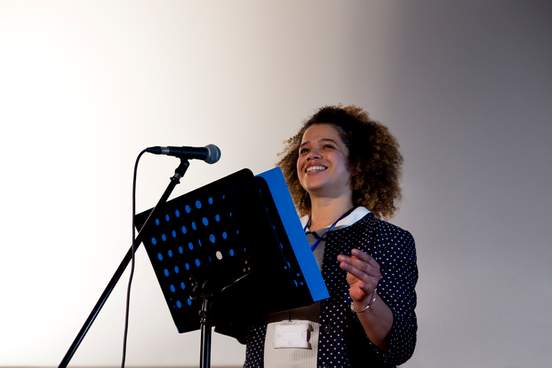
Logophile
A logophile is someone who loves words. Are you a logophile? We suspect you are. We are logophiles too.
The logo of logophile comes from the Greek word logos, meaning “speech, word, reason.” The phile part means “loving; having a fondness or affinity for,” and it comes from the Greek word philos, meaning “beloved, dear, loving.”

Hapax legomenon
This is a visually impressive word, and we think it is woefully underused. Perhaps it is underused because it refers to a rare thing: a hapax legomenon is a word or form that occurs only once in a document or corpus. While rare, there's nothing that actually prevents one from having more than one hapax legomenon in a text, in which case you have hapax legomena because that’s the plural form.
Hapax legomenon was borrowed in the late 17th century directly from Greek, in which language it means “something said only once.”

Onomatope

Epithet
An epithet can be perfectly nice—simply a special word or phrase that describes a person or thing. One might, for example, use “the father of American lexicography” as an epithet for good ol’ Noah Webster. But epithet can also refer to an offensive word or name that’s used as a way of abusing or insulting someone; those are the epithets that people sometimes hurl at each other. If you’re tempted to use a really mean epithet of this type we suggest you browse here for something funnier and less potent.

Back-formation
A back-formation is a word that is formed by the subtraction of a real or supposed affix from an existing longer word. Burgle is a back-formation from burglar, for example. And televise is a back-formation from television. The name of that lovely roly-poly green vegetable known as the pea is similarly formed: in Middle English, one could have “a spoonful of pease,” or “some pease,” much as one now has a shovelful of sand or some sand. People misunderstood the \s\ sound at the end of pease as a plural, and the back-formation pea was born.

Weasel word
Always look askance at a weasel word—that is, if you can recognize it for what it is. A weasel word is any word used in order to evade or retreat from a direct or forthright statement or position. Context is everything when you’re talking about weasel words—it’s all about how they’re used.
The term, which dates to the early 20th century, comes from a habit weasels are reputed to have of sucking the contents out of an egg while leaving the shell otherwise perfectly intact.

Mot juste
Come up with a mot juste and you can pat yourself on the back. Mot juste refers to the exactly right word or phrasing. (If you have two of them give yourself a double pat for your mots justes.) The term is a direct borrowing from French, having been lifted from that language in the late 19th century. Emily Morse Symonds, writing under the pen name of George Paston, applied the word soon after its adoption to a character in her 1899 novel A Writer’s Life: “She could launch her sentences into the air, knowing that they would fall upon their feet like cats, her brain almost painlessly delivered of le mot juste…”

Jawbreaker
While you may know jawbreaker as a word that refers to a kind of very hard candy dentists warn us about, the term also refers to a word that is difficult to pronounce. We ourselves are fond of jawbreakers, such as sesquipedalian, which describes words that have lots of syllables as well as people who use, or writings that feature, long words. Another one that takes practice to perfect is pneumonoultramicroscopicsilicovolcanoconiosis, which refers to a disease of the lungs caused by inhalation of very fine silicate or quartz dust.

Bug word
Nobody talks about bug words anymore. We label the term “obsolete,” but don’t let that stop you from applying it where it is of use. A bug word is a word that is used to terrify. Bug word can also refer to threatening language in general.
It comes from an obsolete word bug used to refer to a scary goblin, phantom, or specter. That bug comes from a Middle English word meaning “scarecrow.”

Dirty word
Since at least the mid-18th century, dirty word has been used to refer to a word, expression, or idea that is disagreeable or unpopular in a particular frame of reference. Dirty words can simply be offensive words—words you’re taught to avoid using in the presence of people who are offended by rude and coarse language, as well as in formal contexts of any kind. But dirty words can also be topics or ideas that some people dislike. Making lists of words about words is definitely not a dirty word.





